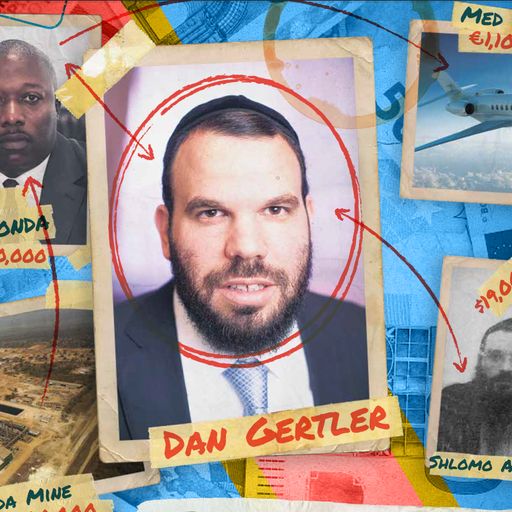

Congo Files: Cash Was Deposited Into Dan Gertler's
Accounts, Then Millions Were Transferred to Top Israeli Figures
By Gur Megiddo and Hagar Shezaf
Israeli paper Ha'aretz, July 2, 2020
Original article link
here, archived full article
here
Israeli billionaire Dan Gertler
owns mines in the Congo
■ In 2017 the U.S. imposed sanctions on him due to corrupt deals
with the DRC's former president
■ Documents from the African state reveal irregular cash
deposits made by Gertler's associates into his accounts
■ Some of the money was then sent to lawyers and advisers in
Israel
■ Gertler: 'The documents are stolen and fabricated'
In January 2018 the streets of Kinshasa, capital of the
Democratic Republic of the Congo, were awash with the blood
of violent disturbances. The United Nations reported six
fatalities in a string of clashes between the security
forces and young residents of the city. The protesters’ ire
was aroused by the refusal of the then-president, Joseph
Kabila, to hold an election, even though his term of office
had expired almost two years earlier.
An unusual figure was seen in Kinshasa’s streets in that
volatile period: a man in the attire of an ultra-Orthodox
Jew, hat on his head, suitcase in hand. According to
documents obtained by TheMarker, on January 23, 2018, the
man entered a Kinshasa branch of the Afriland First Bank.
According to the documents, he deposited $1 million in the
account of a local company called RDHADG SARLU, which had
been established a few weeks earlier, with him registered as
a director. According to the records, the next day he
returned to allegedly deposit another $875,000. Two days
later, he arrived a third time and allegedly deposited
$926,000 more. According to the documents, all the deposits
were made in cash.
The local tellers found it difficult to spell the name of
the stranger carrying the suitcases. “Shono,” or “Mr.
Shlono,” they named him at first. Afterward it became “Mr.
Shlomo” or just “Shlomo.” Eventually, they learned how to
spell his full name: Shlomo Eliahu Abihassira.
By June 2018, 14 other deposits by Shlomo Abihassira were
recorded. According to the records, each time, he brought
between $900,000 and $3 million, allegedly in banknotes. All
told, $19 million worth of cash deposits that he allegedly
made were registered in his name at the bank, of which $17
million went into the account of the same Congolese company:
RDHADG. Approximately $1 million of the sum total, according
to the records, were deposited by Abihassira in an account
bearing his name, and another million went into the account
of a local firm called Interactive Energy. Abihassira denies
making any deposits at the bank.
The Rabbi and the billionaire
Shlomo Abihassira is a scion of an Israeli-Moroccan dynasty
of kabbalists. His great-grandfather was Rabbi Yisrael
Abuhatzeira, known as the Baba Sali. His father, Rabbi David
Abuhatzeira, was formerly chief rabbi of the northern
Israeli city of Nahariya and today manages the affairs of
one of the wealthiest rabbinic dynasties in Israel. A decade
ago, Forbes estimated David Abuhatzeira’s fortune at 750
million shekels (about $202 million at the time). David is
also the rabbi and confidant of a man who was one of the
most powerful figures in the Congo at the time, the Israeli
billionaire Dan Gertler, a resident of the largely Haredi
city of Bnei Brak. In a country as rich in natural resources
as the DRC, there is only one resource more valuable than
the minerals themselves: a direct channel to those in power,
a commodity Gertler undoubtedly possessed. Even the world’s
largest mining companies had to go through Gertler to gain
access to the country’s mines.
The relations between the rabbi’s family and the billionaire
are more than those of spiritual mentor and acolyte. Among
the Panama Papers – the documents leaked to the
International Consortium of Investigative Journalists from
the Panama-based international law firm Mossack Fonseca in
2016, which revealed the use by many businessmen of tax
shelters – is a draft agreement, which was termed a
consultancy contract, worth millions of dollars, between
Shlomo Abihassira’s brother Yitzhak, and Gertler’s group of
companies. The
agreement’s existence was first reported by Uri Blau and
Daniel Dolev in Haaretz.
Shlomo Abihassira was also a suspect in 2013 in a large-scale
money-laundering case dubbed the "Art Affair," in which another
suspect was one of Gertler’s lawyers, Avi Lavi – who left Israel
just before the start of the police investigation, and did not
return. No indictments have been filed in the case to this day.
Even the world’s largest mining companies had to go through
Gertler to gain access to the country’s mines.
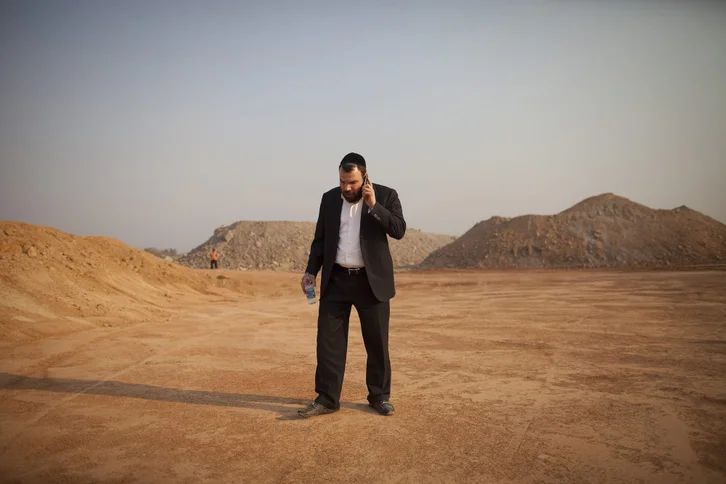 Dan Gertler.
Credit: Bloomberg
Dan Gertler.
Credit: Bloomberg
In December 2017, a month before the Baba Sali’s great-grandson
allegedly began visiting the Afriland Bank in Kinshasa with
large quantities of cash, the U.S. Treasury Department, as part
of its war on international bribery,
imposed sanctions on Gertler, one of his business associates
and 14 companies linked to him. According to the directive,
which was extended to additional companies in mid-2018, “Gertler
has used his close friendship with DRC president Joseph Kabila”
to become “a middleman” in “corrupt mining and oil deals” in the
DRC. In addition, the U.S. government noted, “Gertler has acted
for or on behalf of Kabila, helping Kabila organize offshore
leasing companies.” The Treasury Department stated that “between
2010 and 2012 alone, the DRC reportedly lost over $1.36 billion
in revenues” from the underpricing of mining assets as a result
of Gertler’s actions.
As a consequence of the sanctions, Gertler is today anathema
to many business entities. Any bank that wishes to operate
in the United States is prohibited from providing services
to Gertler in U.S. currency. Legally, there is nothing to
prevent Gertler from receiving services from banks in other
currencies. In practice, however, Israeli and other banks
reject clients and payments that are linked to an entity or
an individual on whom the United States has imposed
sanctions. Within the sanctions framework, American citizens
are prohibited from doing business with Gertler.
But while banks in Israel and elsewhere rejected financial
transfers when they discovered that their source was
Gertler, Afriland Bank in Kinshasa welcomed Gertler with
open arms.
The investigation’s documents, which were first made
available to the Paris-based human rights organization the
Platform to Protect Whistleblowers in Africa (PPLAAF) and to
Global Witness, show that Abihassira has allegedly not been
the only Gertler associate to show up at the bank with
unusual amounts of cash. The documents, which were
investigated by The Marker, the two organizations and other
professionals as a part of a cooperative, international
journalistic endeavor, also show how a series of associates,
NGOs, lawyers and very senior media advisers in Israel and
elsewhere received payments whose source allegedly lies in
the alleged cash deposits associates and employees brought
to the Afriland First branch. Documents made available to
The Marker during the investigation show that banks in
Israel were concerned that some of the transfers from
accounts that are connected to Gertler at the Afriland Bank
fit the definition of a “red flag” that elicits suspicion of
money laundering.
"The investigation shows how easy it is for people with
power and capital to exploit inefficient bank regulation,
corporate confidentiality and legal tricks despite having
been accused of corruption," says Gabriel Bourdon-Fattal of
PPLAAF. "In Israel and outside it, regulators need to take
significant steps to fix the weak points in the global
financial system."
Sharks smelling money
Dan Gertler hails from one of the aristocratic families of
Israel’s fading diamond industry. He is the grandson of
Moshe Schnitzer, who established the Ramat Gan-based Israel
Diamond Exchange, and the son of Hannah Gertler, who was
both a socialite who established the philanthropic
organization of diamond merchants’ wives and a businesswoman
who invested in multiple technology, media and real estate
ventures over the years.
The family gained fame in Israel partly in connection with a
criminal drama in 1995, when Gertler’s sister, Keren, was
kidnapped by the criminal Avi Sapan and his daughter, in an
attempt to obtain a $2-million ransom payment from the
affluent family. The incident ended when Israel Police
officers pumped 11 bullets into Sapan, killing him. Dan
Gertler was around 20 at the time, ambitious and (still)
secular, eager to prove that he, too, knew how to make big
money. His foray into Africa began in those years, when the
DRC was known as Zaire.
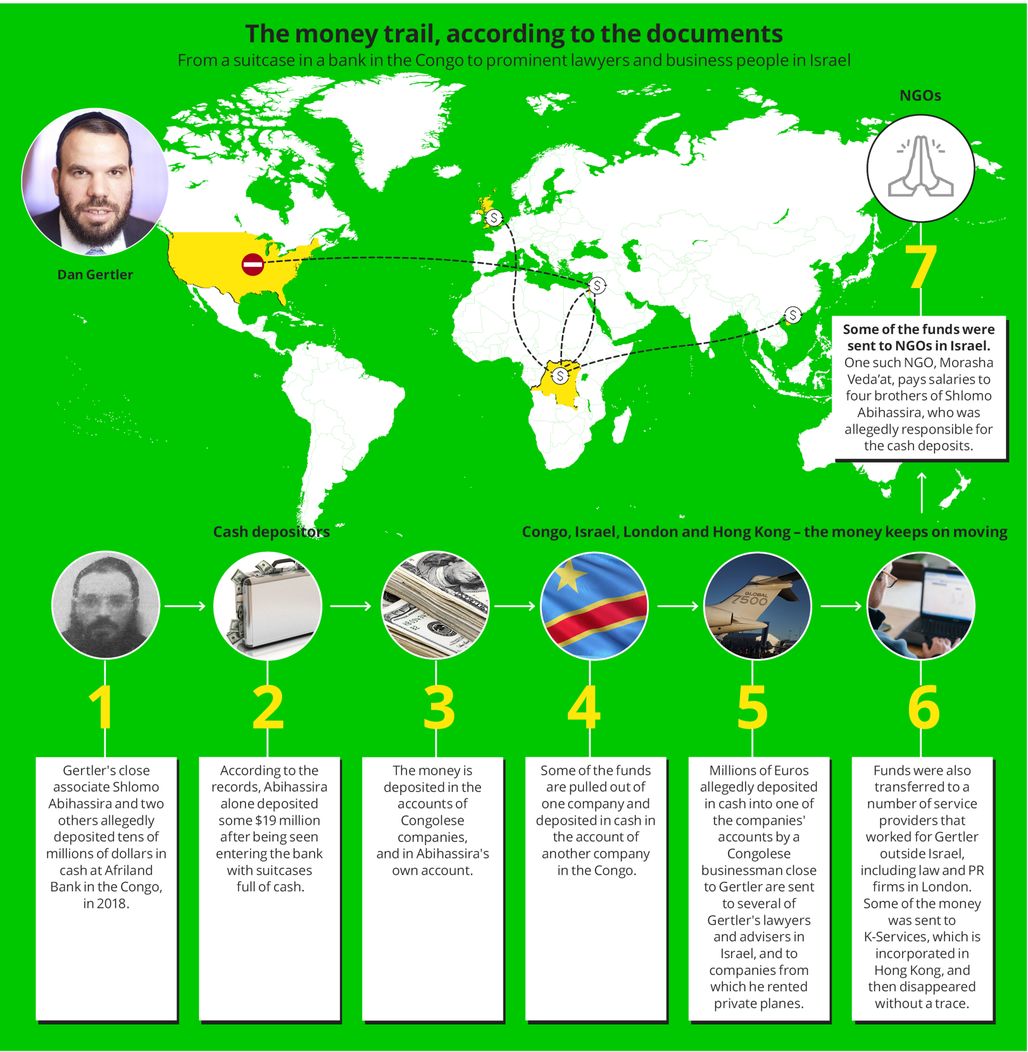
The First Congo War erupted in 1996 and brought about the
removal of the longtime dictator of Zaire, Mobutu Sese Seko,
by militia forces under Laurent Kabila, the rebels’ leader.
When the hostilities ended, Kabila declared himself
president of the country, which he renamed the Democratic
Republic of the Congo.
The Second Congo War, which broke out about a year later and
continued for five years, until 2003, is the deadliest
conflict humanity has known since World War II. More than
five million people lost their lives and millions more were
wounded or became refugees. The war had various causes
deriving from political and tribal conflicts, from vested
interests of the countries that were involved in it –
particularly Rwanda, Congo’s neighbor to the east – and from
economic interests related to the mineral wealth in the
DRC’s east and south. (The DRC is the world’s 11th-largest
country in area – Israel could fit into it about 11 times.)
The cannons roared, the machetes slashed, homes burned and
women were raped. Even as the smell of blood pervaded the
unfortunate republic, some sharks in the area smelled money.
Around 1998, the young Gertler landed in Kinshasa, driven by
the goal to become close to the new president. His
acquaintances share different versions of how he went about
ingratiating himself with the ruling family, but what is not
in dispute is that he succeeded.
To begin with, Gertler discerned the new government’s hunger
for cash. For just $20 million, which he raised from
acquaintances in the Israeli diamond industry, he received
an exclusive permit to mine diamonds from the DRC.
Subsequently he was also involved in Kabila’s efforts, which
were not very successful, to acquire military know-how and
weapons from Israel, as legal proceedings between him and
security consultant Yossi Kamissa over the past decade have
revealed. Eventually he found his place as one of the
kingpins of the DRC’s mining industry, though not
necessarily in diamonds.
Gertler became an essential station on the path of
international companies seeking mining permits in the rich
lands of the poor republic. This is especially the case in
regard to cobalt, a mineral found in abundance in the DRC,
and considered the new gold because of its extensive use in
the manufacture of batteries, particularly for smartphones.
Gertler’s close ties with the ruling family in the Congo
remained solid even after Laurent Kabila was assassinated by
his bodyguard in 2001. His son, Joseph, succeeded him and
headed the country for 17 years, until January 2019. During
that period, he was elected president twice, in 2006 and in
2011, but he put off the election scheduled for 2016 for
almost three years.
Joseph Kabila’s nearly two decades in power were Gertler’s
golden years in the land lined with cobalt and flowing with
blood. From a millionaire he became a multimillionaire and
then a billionaire, and manifestly one of the people most
closely identified with the government. According to reports
he became a Congolese citizen, a diplomatic envoy for Kabila
– and a target of law enforcement and anti-corruption
agencies in the United States, Britain, Switzerland and
Israel.
Joseph Kabila’s nearly two
decades in power were Gertler’s golden years in the land lined
with cobalt and flowing with blood. From a millionaire he became
a billionaire, and manifestly one of the people most closely
identified with the government.
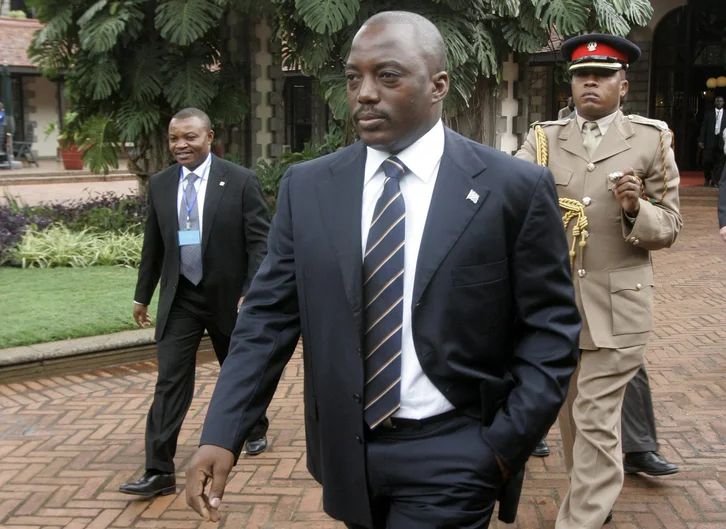 Joseph Kabila, former president
of the Democratic Republic of the Congo.
Credit: REUTERS
Joseph Kabila, former president
of the Democratic Republic of the Congo.
Credit: REUTERS
In 2016, the U.S. Department of Justice and the New
York-based hedge fund manager Och Ziff, which was involved
in mining business in the DRC, signed a settlement agreement
in which the company paid a fine of over $400 million for
having bribed public officials in African countries,
including the DRC. The agreed-upon indictment, to whose
details Och Ziff admitted, states that between 2005 and
2015, through a person described as “DRC Partner,” as “an
Israeli businessman whose identity is known to the United
States” and as someone with “significant interests in the
diamond and mineral mining industries in the [DRC],” the
company paid around $100 million in bribes to senior figures
in the Congolese government in order to obtain various
mining permits, including for cobalt and copper. According
to a court filing, Och Ziff was requested to pay the
investors of Africo at least $150 million in compensation.
The latter owned the mining rights at a copper and cobalt
mine called Kalukundi. The Congolese government revoked the
mining license of Africo, and Gertler and Och Ziff
eventually took control of rights to the mine for an alleged
bargain price, as a part of a corrupt deal to which Och Ziff
admitted.
In Britain, an investigation has been underway since 2013
into mining permits granted in the DRC to a Kazakh company,
Eurasian Natural Resources Corporation (ENRC). The firm,
which was traded in the past on the London Stock Exchange,
is controlled by the Jewish-Kazakh billionaire Alexander
Machkevitch. At the center of the inquiry are payments of
tens of millions of euros allegedly made to Gertler’s
companies, with ENRC’s former lawyers raising the suspicion
that the money was bribery given in return for mining
rights. ENRC denied the allegations in response to various
reports in the past. Since January, an investigation has
been underway in Switzerland into suspicions of bribery
around the mining permits granted to the multinational
commodity trading and mining company Glencore and Gertler’s
Congolese companies.
When President Joseph Kabila yielded to pressure and
declared an election for December 2018, he said he would not
seek another term of office. His chances were considered
poor in any case. The candidate he supported lost. The new
president, Félix Tshisekedi, has been moderate in his
remarks about Gertler, but it’s not clear whether the
latter’s businesses will continue to flourish as they did in
the past. “There is no doubt that Gertler’s influence in the
country has diminished since the Kabila period, and time
will tell by how much,” says a European businessman who is
active in Kinshasa.
Money deliveries to Israel
RDHADG, the company into whose account Abihassira deposited
$17 million in cash, according to the documents, is only one
of a series of new firms connected in different ways to
Gertler and his associates that were established in Congo in
the period around the imposition of the U.S. sanctions in
2017. The documents of the investigation show a string of 10
more companies controlled by a corporation called Gerco Sas,
whose registered owners are Gertler’s wife and nine of their
12 children, some of them minors, in equal shares.
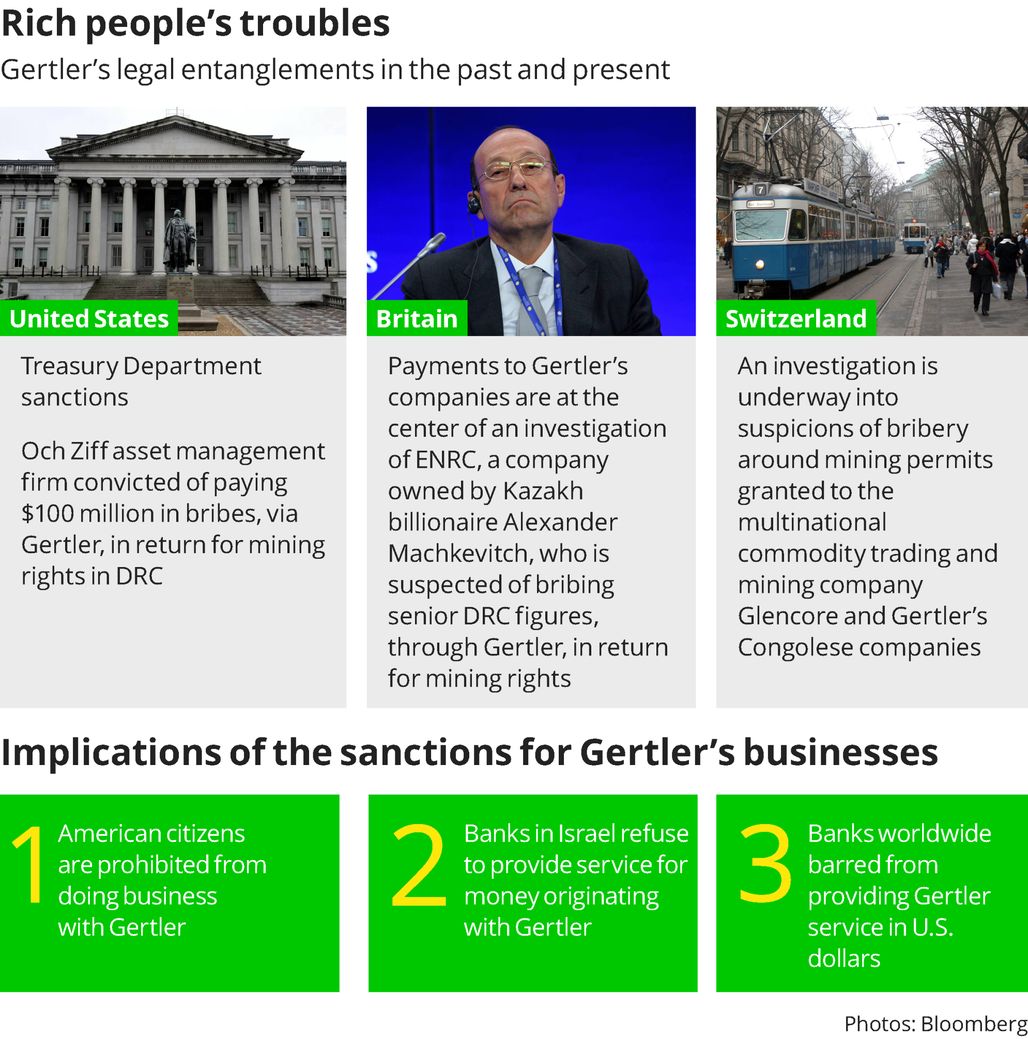
The United States automatically imposes sanctions on a
company if 50 percent or more of its shares are held by an
individual on whom it has imposed sanctions. This might be
why officially Gertler himself is not a shareholder.
In most of the new companies, a Congolese citizen named
Alain Mukonda is registered as a director. Like Abihassira,
Mukonda, too, was seen at the Afriland Bank with unusual
sums of cash, carried in suitcases. According to the records
he was at the bank around 20 times, with amounts ranging
from tens of thousands of euros to €1.7 million. All told,
he was recorded depositing nearly €12 million. One million
of the sum were, according to the records, deposited in
April 2018 in an account bearing Abihassira’s name, and the
rest to companies that Gertler does not deny he controls.
Mukonda denies any cashdeposits were made, and claims that
the documents attesting to the deposits are forgeries.
Most of the funds – more than €8 million – were earmarked
for Ventora Global Services, one of the local companies
Mukonda established in March 2018. The documents reveal that
the company served as a launchpad for bank transfers of
funds to various entities connected with Gertler, many of
them in Israel.
The largest amount sent from the company’s account went to
Israeli lawyer Avigdor (Dori) Klagsbald. The documents show
that during 2018, €2.4 million was sent to Klagsbald’s
account in several installments. Klagsbald may well be
Israel’s best-connected lawyer. It’s hard to think of anyone
else whose circle of friends includes past and present
Supreme Court justices such as Anat Baron, Uzi Vogelman, his
former law firm partner Yoram Danziger and current Supreme
Court President Esther Hayut, alongside Mossad head Yossi
Cohen, with whom Klagsbald maintains a close friendship, as
recently revealed in a civil dispute.
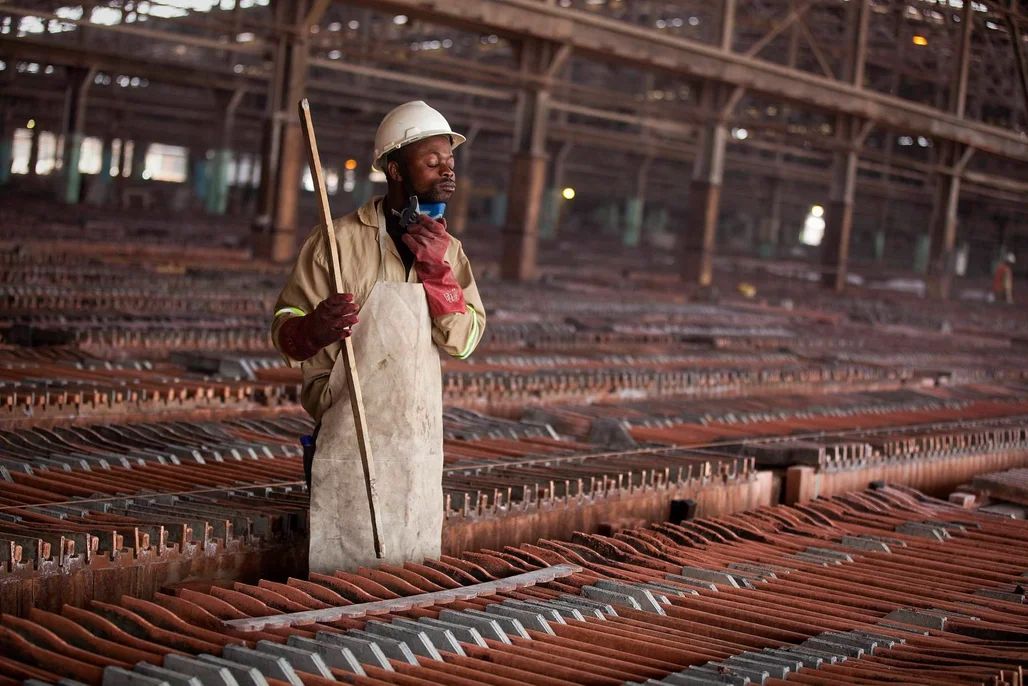 A copper mine worker in the
Democratic Republic of the Congo.
Credit: Bloomberg
A copper mine worker in the
Democratic Republic of the Congo.
Credit: Bloomberg
Klagsbald’s list of clients begins with the State of Israel
itself, which appointed him a mediator in the hugely complex
arbitration proceedings with Iran involving the old
Eilat-Ashkelon oil pipeline, and extends to American casino
tycoon Sheldon Adelson, who owns the handout newspaper
Israel Hayom, shipping and motor vehicle mogul Rami Ungar –
and seems to go on indefinitely. Now, consider the road
taken by the money on the way from client Gertler to the
distinguished attorney.
Another top lawyer who received payments from the Congolese
company is Boaz Ben Zur, who has represented Gertler in
recent years. Ben Zur also represents, among others, former
Israel Bar Association chairman Efi Naveh and Miki Ganor,
the central suspect in the case of suspected corruption in
Israel’s purchase of naval vessels from Germany. Between
April and June 2018, €427,000 were forwarded to Ben Zur from
the Congolese account of Ventora Global Services.
Attorney Eitan Maoz, the defense counsel in some of Israel’s
most notable judicial cases – in recent years he represented
the billionaire Lev Leviev and the convicted judge Dan Cohen
– is also on the list of the beneficiaries from one of the
company’s Afriland accounts. In May 2018 he was the
recipient of €265,000.
A 2017 amendment to Israel’s Prohibition of Money Laundering
Law requires lawyers and practitioners of other professions
to fill out a “know your customer” form, and obligates them
to consider whether the client’s behavior gives cause to a
suspicion of money laundering. If it does, they must refrain
from giving services to that client, and if nevertheless
they do work with him, they must explain their decision in
written form and keep the detailed, signed decision in their
office. The three lawyers maintain that they followed these
guidelines dutifully, and reported to banks in Israel that
the source of the money they received was a company
connected to Gertler.
A document made available to TheMarker shows how in one
case, a compliance officer in an Israeli bank warned a
client – a service provider to Gertler – that a partial or
mendacious declaration constitutes an offense under the
Prohibition of Money Laundering Law. After contemplating the
matter, the service provider reported that the source of the
money was a company under the effective control of Gertler.
The Israeli bank refused to accept the transfer of funds,
because Gertler is on the U.S. sanctions list, and the money
was sent back to Kinshasa.
Another beneficiary of the Ventora Global Services account
is the strategist Ronen Zur, who was Gertler’s media adviser
until recently, and who was an adviser to Benny Gantz, today
the alternate prime minister, during Israel’s last three
election campaigns. In April-May 2018, the company sent
€210,000 in three installments to Zur’s company, Zur
Strategic Consulting and Campaign Management, in Ramat Gan.
In the Haredi world, Gertler is known primarily as a
philanthropist, or “nagid” (Hebrew for “prince” or, for our
purposes, a patron) and he is often referred to this way on
Haredi gossip sites. The Congo documents attest to hefty
monetary transfers to nonprofit organizations in Israel.
Thus, €700,000 from Ventora Global Services’ account was
sent to an NGO called Morasha Veda’at. Earlier reports in
the Haredi press show this to be a kollel – a yeshiva for
married men – in Bnei Brak, to whose students Gertler
provided scholarships in the past. According to the
organization’s filings with Israel’s NGO registry, four of
the five recipients of its highest salaries are Shlomo’s
brothers, four other sons of Rabbi David Abuhatzeira: Meir,
Yehuda, Shimon and Yosef. Each is registered as “head of
kollel,” with a salary of about 200,000 shekels ($53,000) a
year each.
The amount of €1.1 million was sent from Ventora Global
Services account to another nonprofit, Savanu Metuvach,
which was established only at the beginning of 2017, and
which during its first full year of operation, 2018,
reported impressive revenues of 12 million shekels (about
$3.5 million).
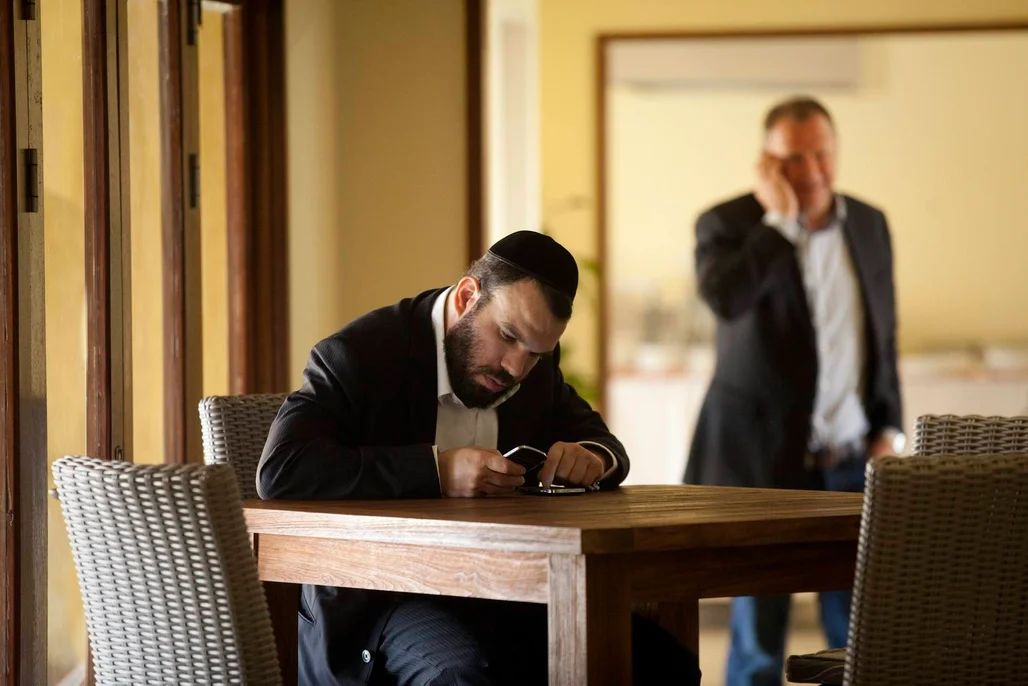 Dan Gertler.
Credit: Bloomberg
Dan Gertler.
Credit: Bloomberg
According to the documents, $40,000 were deposited by
Mukonda, Gertler’s confidant, directly to the wife and three
daughters of Pieter Deboutte, a Belgian-Congolese citizen
who is one of Gertler’s business associates and the only
other person named together with him in the U.S. sanctions
order. During 2018, another $160,000 in cash was deposited,
according to the records, in accounts bearing Deboutte
family members' names, by the account’s owners. The same
day, €32,000 was deposited into the account of Deboutte
himself. An associate of Deboutte denied that money was
deposited by Mukonda into accounts of the Deboutte family.
Lieberman’s lawyer, the Weinstein firm
From the Ventora Global Services account, €70,000 was
allegedly sent to the account of attorney Yoav Mani, until
not long ago the lawyer of the Yisrael Beiteinu party and a
confidant of its leader, Avigdor Lieberman. Mani was
questioned in the affair of the shell companies during the
sprawling investigation that was conducted against Lieberman.
Gertler’s part in the case concerns a half-million dollars
that landed in the account of a foreign company called
Mayflower, which the police suspected belonged to Lieberman,
whose driver officially held the controlling interest in it.
In her Hebrew-language book “The Avigdor Lieberman Case,”
attorney Avia Alef, who was head of the economic crimes
department in the state prosecution and was slated to be the
prosecutor in the case had it gone to court, states that a
considerable number of the documents in the Mayflower affair
were seized in Mani’s office. This, she notes, hindered the
investigation of the company’s business transactions, as
Mani claimed lawyer-client confidentiality for his two
clients, Gertler and Lieberman.
Mani, it turns out, continued to be a recipient of payments
by Gertler and remained Yisrael Beiteinu’s legal adviser
until May 2018, when the money was sent to him. In a
conversation with TheMarker, Mani refused to address a
question regarding whether he had reported to his bank that
Gertler’s companies were the source of the money.
RDHADG, the company into whose account
Abihassira deposited $17 million, according
to the documents, is only one of a series of
new firms connected in different ways to
Gertler and his associates that were
established around the imposition of the
U.S. sanctions.
It was the attorney general at the time, Yehuda Weinstein,
who decided in 2012 to close the investigation into the
shell companies, citing lack of evidence. Weinstein is now a
private attorney in the law firm of Dror, Menchel and
Weinstein, in which his daughter, Karin, is a partner. He
joined the firm after finishing his role as attorney
general. The former attorney general is listed on the firm’s
stationery as an adviser to the firm. Two of the firm’s
partners, Ophir Menchel and Ron Dror, are also connected
with Afriland First accounts. Menchel opened an account in
the bank in 2018, using Dror’s phone number on the
registration forms.
An investigation by The Marker reveals that Menchel’s
account was earmarked to receive a fee in an unknown amount
for consultancy servicers to Gertler. The attempt to
transfer funds to Israel was unsuccessful, as a foreign
correspondent bank denied the transfer due to the sanctions
against Gertler.
Weinstein’s decision to close the case of the shell
companies in 2012 was probably the most controversial of his
tenure as attorney general. About a year ago, Yair
Netanyahu, the prime minister’s elder son, claimed in a
tweet that Weinstein was appointed attorney general by
Benjamin Netanyahu’s government in 2009 in the wake of a
demand put forward in the coalition negotiations by
Lieberman, the chief suspect in the case at the time. The
allegation was later denied by Lieberman, Weinstein and Yair
Netanyahu’s father.
The picture that arises isn’t a pleasant one. It emerges
that the firm in which Weinstein and his daughter constitute
40 percent of the lawyers (according to the firm’s staff
list), is representing the person whose case was closed by
Weinstein.

Credit: Bloomberg
The records of the Ventora Global Services account also show
money transfers to service providers outside of Israel that
did work for Gertler. For example, tens of thousands of
euros were transferred to the London-based PR firm
Powerscourt. The law firm of Mishcon de Reya, also
headquartered in London, received €130,000.
Caught with cash on a plane
At the end of 2017, before Mukonda founded Ventora Global
Services, he was registered as a director in the similarly
named company Ventora Development, which was previously
incorporated in the British Virgin Islands under the name
Fleurette Mumi Holdings. The company was placed on the U.S.
Treasury’s sanctions list, but days before the list was
published, it changed its name to Ventora Development and
redomiciled to the DRC. The company’s account in Afriland
First encountered no hindrances, despite the sanctions,
albeit in euros rather than dollars.
At the beginning of 2018, Mukonda himself deposited,
according to records, €2.4 million in cash in the Ventora
Development account. Mukonda denies the deposits and claims
the documents that attest to them are forgeries. In the
months that followed, an additional €20 million entered the
company’s account from various sources. Of this, about €18
million was received in connection with the Mutanda copper
mine, in southeast Congo. The payments came from Glencore,
the vast international commodities corporation, which
operates the Mutanda mine. Glencore had undertaken in a
contract to pay Gertler’s companies’ royalties from its
mining activity. When the sanctions were imposed, Glencore
halted the payments to Gertler for a quarter, and Gertler
launched legal proceedings. The parties finally agreed that
royalties of 2.43 percent from the mine’s sales would be
paid in euros, not dollars, to Ventora Development, and this
is what took place, according to the documents.
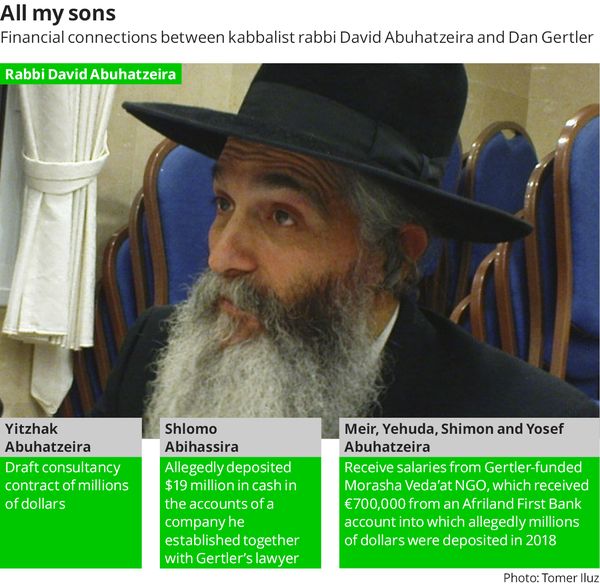
A few weeks later, the U.S. Justice Department announced
that it was launching an investigation into Glencore’s
behavior in the mining industry in several countries,
including the DRC.
Two additional companies connected with Israel received
substantial amounts from both Ventora Global Services and
Ventora Development. During 2018, the Congolese companies
transferred €1.1 million to the Israeli tourism company Med
Cruises, whose principal business is pleasure cruises, along
with a side business of renting private planes. According to
reports in a number of gossip columns, Gertler has social
ties with the company’s owner Anat Samovsky, and attended
her daughter’s wedding in 2015.
Another company that was the recipient of funds from both of
the Ventora companies managed by Mukonda is WayLawn, which
has one private plane for rental and is incorporated in the
British Virgin Islands. WayLawn received transfers of
€227,000 in the first half of 2018.
The company’s name came up in the Panama Papers leak
reported by the International Consortium of Investigative
Journalists. The documents revealed that the company was
previously under the control of the Israeli billionaire Idan
Ofer, who is the majority shareholder in the Israel
Corporation, formerly Israel’s largest holding company;
WayLawn maintained his executive jet. However, the company
and its plane were sold in 2009 to two foreign companies
that are also incorporated in tax havens.
TheMarker was able to confirm that the purchaser in the deal
was the businessman Eytan Stibbe, a retired combat pilot who
formerly had the most kills of enemy aircraft in the Israeli
armed forces. Stibbe was a founder of the LR Group, which
enjoyed close ties with Angolan authorities during and since
the country’s civil war in the ‘90s. (Stibbe has since left
that company.)
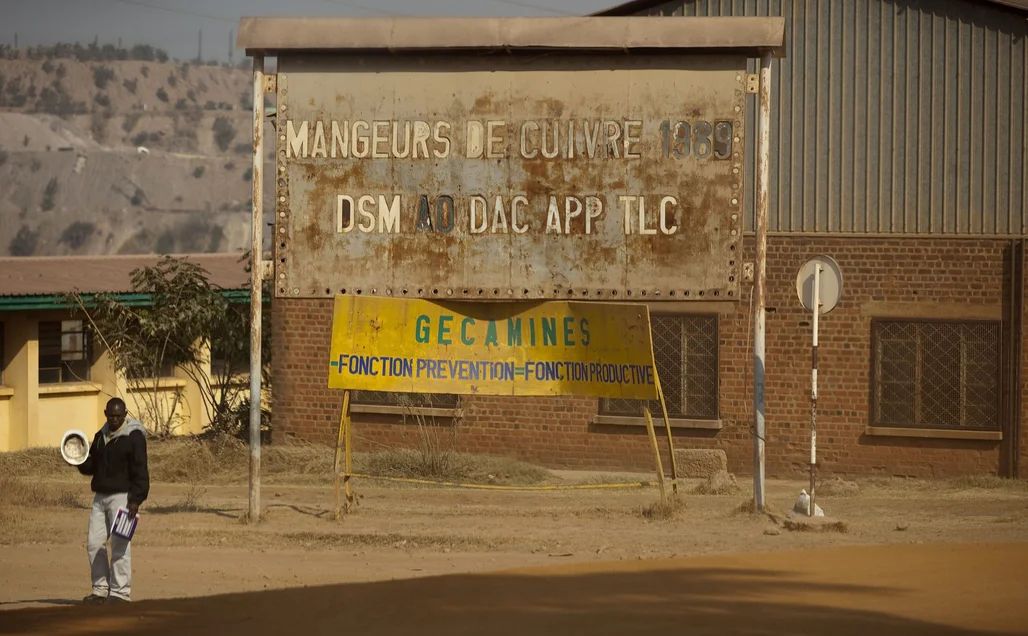
Credit: Bloomberg
The two transfers are related, as TheMarker found out, to
the leasing of a private plane in the period of the U.S.
sanctions. According to a source in Gertler’s circle, one
result of the sanctions was to bring about the temporary
grounding of his private Bombardier plane, with which he
plied the Israel-Congo route. The source related that the
crew of the American plane resigned proximate to the
imposition of the sanctions and that it took time to find a
new crew.
In June 2018, Ventora Global Services transferred a sum of
€370,000 to the Afriland Bank account of a company called BH
Consulting. The BH Consulting account was registered in the
bank with an Israeli phone number attached to it that
belongs to a certain Aharon Cohen. Cohen, an employee of
Gertler’s, was detained together with him in November 2013
by customs agents at Ben-Gurion Airport after they landed in
Gertler’s private plane. The two were caught attempting to
bring cash into Israel without reporting the funds to
customs officials. They were carrying $120,000 in six brown
paper envelopes, each containing $20,000. The episode ended
with Gertler’s having to pay a fine.
The Afriland documents show cash deposits into accounts of
two additional individuals close to Gertler. According to
the registration, Gertler’s sister, Keren, visited the
Afriland First branch twice, at the end of 2018 and the
beginning of 2019, depositing €885,000 in two installments
into an account bearing her name. An attempt to transfer
€800,000 of that amount to the account of a company called
Ivega DRC failed, and the money was returned to her account,
according to the records.
The second associate is the Ashdod-based building contractor
Zahi Abou, who recently made headlines when he purchased the
gasoline distribution terminals of Delek Israel in Glilot,
Jerusalem, Ashdod and Be’er Sheva from the tycoon Yitzhak
Tshuva. The terminals, which cover a total area of hundreds
of dunams, were sold for 720 million shekels (about $210
million). In March 2018, €4.2 million was deposited in an
account bearing Abou’s name. The money was subsequently
transferred to Israel, part of it to Otzar Group
Investments, in which he holds the controlling interest.
Abou later became a business partner of Gertler’s mother,
Hannah Gertler. One of their jointly held companies is
Nofech Urban Renewal, which is promoting a large
construction project in Ashdod.
Money comes and goes
It's a reasonable assumption that by
the time the U.S. Treasury gets around to
looking at the unusual cash activity that
arises from the Afriland Bank documents, the
actions of the associates of the cobalt king
from Bnei Brak will have shifted to a
different bank.
An interesting phenomenon that arises from the documents is
the movement of money – back and forth to the same person:
One of Gertler’s associates comes to the Afriland bank,
makes an alleged cash deposit to a certain account, and
later receives part of the money back in different ways.
A case in point is the one with which we began, in which
Shlomo Abihassira, the son of the Nahariya kabbalist, who
deposited, according to the records, $19 million in cash, of
which $17 million went into the account of a new Congolese
company called RDHAGD. Thus, together with another $2
million which were registered as deposited in cash to the
company’s account by a person whose identity is not revealed
by the documents, RDHAGD had $19 million in its account
beginning in March 2018.
According to the records, the entire amount of $19 million
was transferred one morning in August 2018 to a person named
Kalondo Kabamba. According to the documents, on that same
day, August 14, Abihassira transferred $2 million from his
private Afriland account to an account bearing Kabamba’s
name. All told, then, Kabamba was the alleged recipient of
$21 million. That same day it was registered that Kabamba
deposited the exact same amount of $21 million in cash in
the account of a company called Dorta Invest. In this way,
the money, which originated with Abihassira, was allegedly
moved into a new pocket. Between September 4 and September
6, the documents show, Abihassira received around $8 million
back from the Dorta account in three payments.
The movement of money out of and back into the same pocket
was also recorded in connection with Alain Mukonda; €2.1 of
the money he allegedly deposited into the account of Ventora
Global Services got back to him in July of that year.
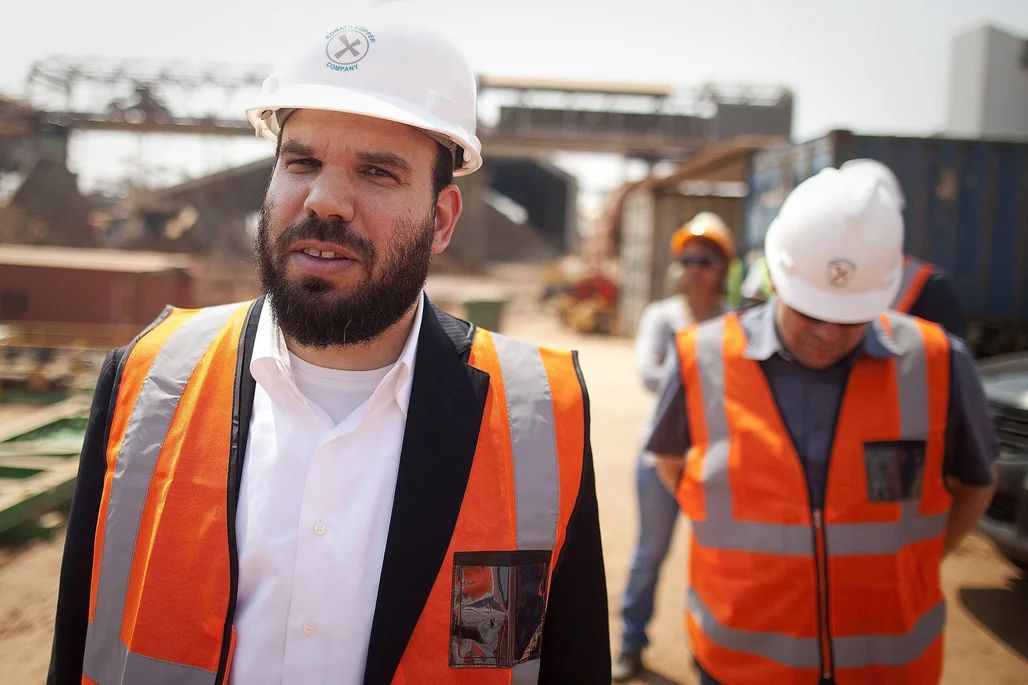 Dan Gertler in a mine in the
Democratic Republic of Congo
Dan Gertler in a mine in the
Democratic Republic of Congo.
Credit: Bloomberg
Kabamba, the man who is on record depositing money into the
Dorta account, appears from the documents to be another cash
courier, connected to different transfers to Gertler’s
associates. According to the records, in August 2018, he
began making deposits into the Dorta account in amounts
starting from $900,000. By the beginning of 2019, he had
allegedly deposited around $32 million into the company’s
account, which was augmented by another $27 million during
the same period from various sources. Part of the money,
$9.3 million, was sent, according to the records, to a
company called K-Services, which is incorporated in Hong
Kong. From there, all trace of it was lost.
One possible rationale for these movements of money is that
as long as the money is in motion, it’s difficult to seize
it or trace it. And if that’s the logic, it’s a reasonable
assumption that by the time the U.S. Treasury Department
gets around to looking at the unusual cash activity that
arises from the Afriland Bank documents, the actions of the
associates of the cobalt king from Bnei Brak will have
shifted to a different bank.
Gertler: 'The documents are stolen and fabricated'
A response made on Dan Gertler's behalf said: "This is an
unfounded report. Our investigations show that your paper is
in possession of stolen documents, a considerable part of
which has been fabricated. The fabrication touches upon cash
deposits, which are at the heart of the claim against Mr.
Gertler and in effect are the premise of the article. There
is conclusive evidence showing that the people to whom the
cash deposits were attributed (i.e. Mukonda and Shlomi
Abihassira) were not in the Congo during the alleged dates
of deposit. This joins additional evidence, including
authentic account pages, forensic examinations of signatures
and more. All these indicate that the claims about cash
deposits made in order to evade sanctions are baseless."
The response also said that "all payments to service
providers were made in Euros in accordance with the law. The
publication of the article will lead to lawsuits – in
England and in Israel – which will reflect the immense
damage made to Mr. Gertler, to his good name and his
businesses. The damage is estimated at tens of millions of
pounds."
Shlomo Abihassira said in response: "While Mr. Gertler is a
friend of my family, whom I know from my youth, we don't
have a business relationship and we never had one. I have
never made cash deposits to any company or account at
Afriland Bank. I have never heard of a company named
Interactive Energy. I have nothing to do with your claims
with regard to Kalondo Kabamba, with whom I am not familiar.
The information about the transfer of cash to the company
Dorta Invest is incorrect. Payments were made by RDHAGD to
Dorta in accordance with the contract between the two, but
not in cash. Moreover, I received a loan from Dorta for the
purpose of developing the businesses of RDHAGD, but the loan
was later repaid. Contrary to your claims, the said
transfers weren’t done in cash. All received payments were
reported as required by the law in Israel and the Congo. The
questions directed at me indicate theft of confidential bank
information and an invasion of privacy. Meanwhile, some of
the questions indicate that the documents you possess
include distortions and fake data."
Alain Mukonda said in response: "Contrary to your claims, I
did not deposit cash in the accounts at Afriland Bank. On
some of the dates you mention I wasn't even in the Congo.
"I haven't deposited money in the accounts of Ventora Global
or Ventora Development, of Pieter Deboutte or Shlomo
Abihassira, and I was unaware that the latter deposited
funds in the accounts related to Gertler.
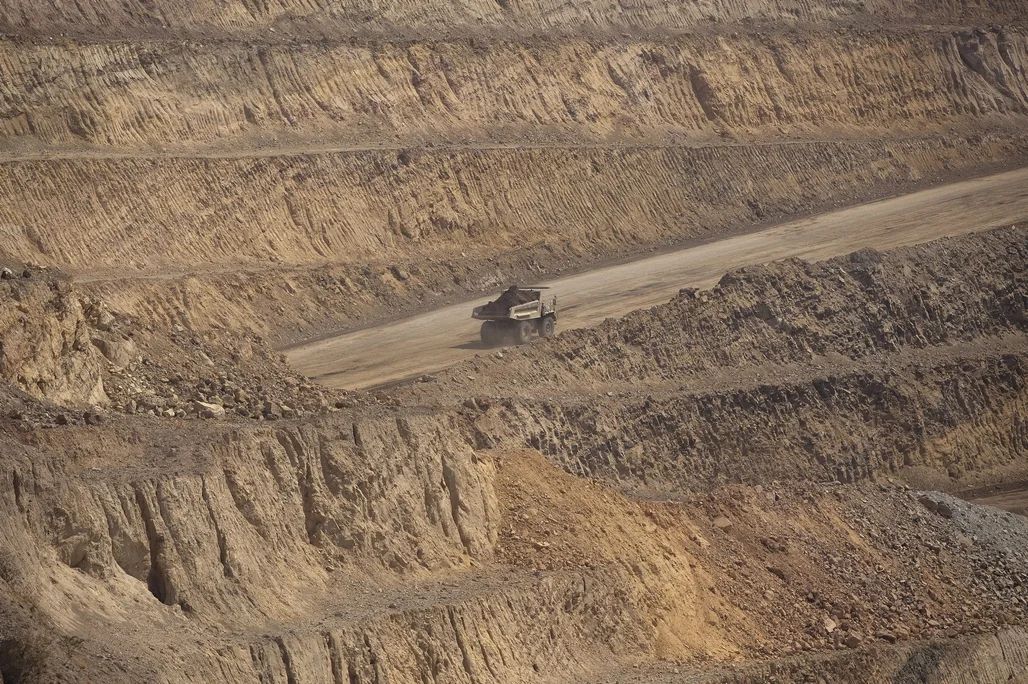 A copper mine in the DRC.
Credit: Bloomberg
A copper mine in the DRC.
Credit: Bloomberg
"The corporate restructuring was planned and started to be
executed, including the relocation of the businesses, before
the sanctions were imposed, of which I, and others in the
companies, had no notice or warning whatsoever.
"The restructuring had nothing to do with the sanctions. It
was to re-locate the various businesses to the DRC where
they were based, which also meant that taxes paid by them
would be paid to the DRC.
"Greco SAS isn't owned by Gertler and his family. The
payment related to the Mutanda mine was legitimate, was paid
in Euros and was made pursuant to contractual obligations
after the settlement of legal proceedings. The payments were
made in a manner which complied with the applicable
sanctions. All payments to companies were made against
invoices and properly accounted for in the relevant company
accounts, for services that were indeed provided."
A response made on Zahi Abou's behalf said: "The document on
which your inquiry is based is fake. Mr. Abou's business
activity in the Congo was and is legal, was reported to all
the relevant authorities in accordance with the law and is
unconnected to Mr. Gertler. Mr. Abou is an innocent leading
businessman and he is a victim of a pressure effort by
TheMarker, the purpose of which is to extort information
about other figures."
Aharon Cohen said in response: "The BH company was in my
sole ownership. The company received a legal loan from
VENTORA. The loan was repaid in full after a few months,
before the end of 2018. The company closed before the end of
2018. The funds were received in Euros. With regard to the
plane incident that you mentioned, I was questioned and not
interrogated. By the end of the process it was made clear
that I did not break the law and I did not pay a fine."
The office of Dror, Menchel & Weinstein said in response:
"We do not address issues related to clients, but we will
note that former Attorney General Yehuda Weinstein and
attorney Karin Weinstein joined our firm a long time after
it began representing Mr. Gertler."
The Waylawn company said in response: "Companies that
operate private planes occasionally ask to use private
planes against reimbursement of costs. It's reasonable to
assume that in this case as well, a request was made to use
a plane for a flight to Africa in return for payment. Had
the company known that the source was subject to a boycott,
the plane wouldn't have been leased."
Med Cruises said in response: "We have no information about
Gertler's affairs or about the deposit of funds as is
claimed in the article. Med Cruises provides flight and
hospitality services to some of Gertler's companies. The
company operates in accordance with the law. All expenses
and services provided by the company are recorded in the
company's books and are fully backed in a legal manner by
invoices (should we be asked by official figures to prove
this, we would.)"
The office of Eitan Maoz said in response: "Just like any
payment that we receive, the fee mentioned in your inquiry
was reported to the bank precisely as a payment made for Mr.
Dan Gertler's legal representation. The payment in question
was subjected to the full compliance procedures and was
approved by the bank and its legal advisers in accordance
with the law."
The office of Klagsbald & Co. said in response: "Since 2010
we have been representing Dan Gertler in various litigation
proceedings. Over the course of a few months in 2018 the
Congolese company Ventora Global Services paid our office a
part of Mr. Gertler's fees. Upon receiving the first payment
from the aforementioned company, we informed the bank that
the funds were Mr. Gertler's fee. We gave the bank all the
required details about the fee and the payments. We have
also provided the bank with every detail they asked for
regarding the fee and the payments. Additionally, we have
answered questions posed by the bank, including about the
ties between Mr. Gertler and the company. These facts are
backed by documents that are in our possession."
Attorney Boaz Ben Zur said in response: "Our office has
represented Mr. Gertler for years. Any payment, without
exception, received by the office is paid for a legal
service that has been provided. The details, including the
final beneficiary, should one exist, are reported to the
bank in full."
Zur Communications said in response: "We can't address the
sums of the charges. The authorities were provided with the
full details and the information required under the law that
relates to the collection of the debt."
The NGOs Savanu Metuvach and Morasha Veda'at, attorney Yoav
Mani and the Deboutte family didn't provide comment.















































